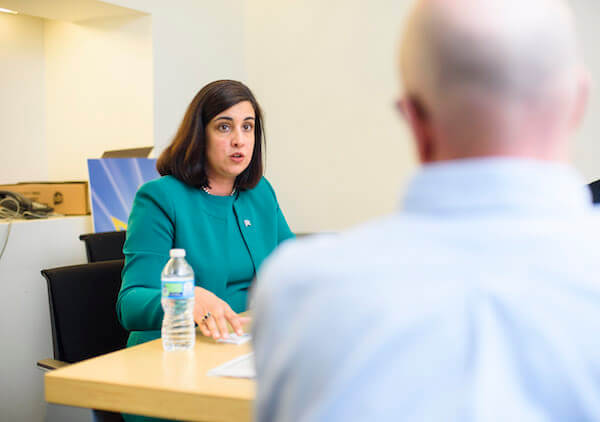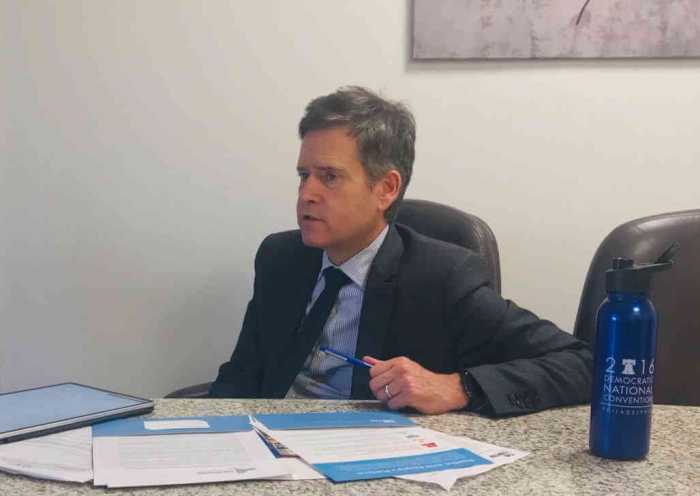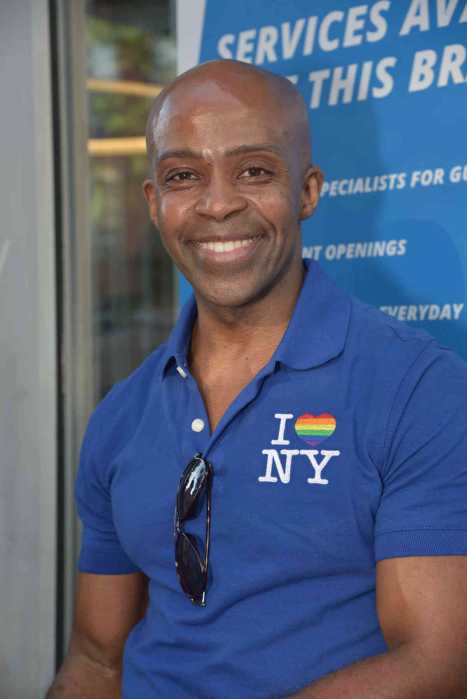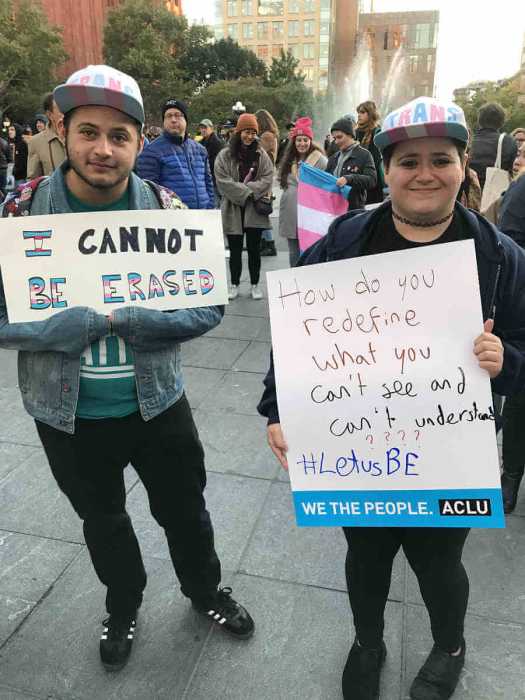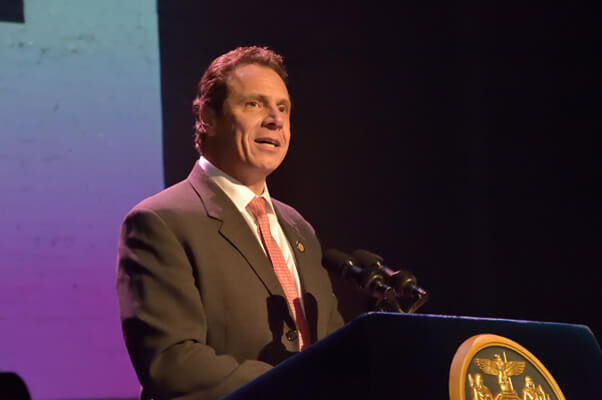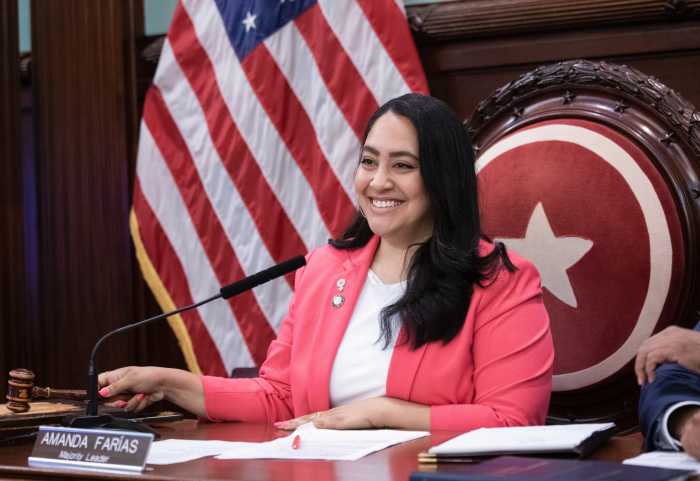PHOTO BY JORDAN RATHKOPF
BY DUNCAN OSBORNE| As she was discussing crime and the extent to which New York City residents feel safe in the city, Nicole Malliotakis, the presumptive Republican candidate for mayor and a member of the State Assembly since 2011, was asked about her continuing opposition to the Gender Expression Non-Discrimination Act (GENDA), which would add gender identity as a protected class to New York’s human rights law, hate crimes law, and other statutes.
“If a man were to follow someone into a restroom… they’re there because they want to commit a crime against a woman and they are caught, they can use that law as a loophole,” said Malliotakis during a May 18 interview with Gay City News and other newspapers owned by NYC Community Media. “I believe there is a loophole in the law that allows it to be exploited for individuals… to commit a type of sex crime.”
Reporters were stunned by that answer.
New York City enacted a law in 2002 that barred discrimination based on gender identity. Currently, 18 states and the nation’s capital also ban discrimination based on gender identity. Though Malliotakis said she was aware of cases outside of New York in which criminal defendants had used such an anti-discrimination law as a shield against criminal charges, no one else in that room had ever heard of such a thing. Her campaign never followed up with promised details on her claim.
Nicole Malliotakis worries about bathrooms… upstate!
“The way it’s written, it gives an individual a defense to say, ‘I was somewhere because of their identity,’” the 36-year-old candidate said. “There needs to some type of component that doesn’t allow people to use it as a criminal defense.”
Malliotakis was first elected to a district representing parts of Staten Island and Brooklyn in 2010. She has easily won reelection every two years since then running on the Republican, Conservative Party, and Independence Party lines.
GENDA has passed the State Assembly 10 times since 2007, with Malliotakis consistently voting “No” during her time in office. The legislation has stalled in the State Senate where it faces opposition from Republicans and the Conservative Party, which is a small but still influential political party on the right.
Malliotakis also voted “No” on 2011 legislation, which was enacted, allowing same-sex couples to wed, a vote she now says she regrets. Her regret drew a rebuke from Michael Long, chair of the Conservative Party, which has endorsed her.
State Assemblymember Nicole Malliotakis meets the press in Gay City News’ offices on May 18. | JORDAN RATHKOPF
In some respects, Malliotakis is an accidental candidate for mayor. While press reports prior to mid-2017 routinely described her as a “rising star” in the Republican Party, she remained largely unknown. She became the party’s presumptive nominee only after realtor Paul Massey, who was widely assumed to be the frontrunner for the Republican nod, abruptly dropped out and Bo Dietl, a former NYPD detective, was booted from the Republican primary.
Her fundraising reflects her status as a candidate who may have been running this time just for practice. In her latest filings with the city’s Campaign Finance Board, Malliotakis reported raising roughly $344,000 since April, with about $275,000 in cash on hand. Mayor Bill de Blasio has raised $4.7 million and has $2.6 million in cash, though he has been raising money for far longer than Malliotakis.
Broadly, Malliotakis’ themes are that de Blasio is not a leader and that the city is seeing crime rising and quality of life plummeting under his watch. She points to the delays in the subway system — which is run by the governor — the homeless, and certain crime statistics to make her argument.
“There’s a whole host of quality of life issues in this city,” she said. “There’s an obvious problem when you walk through this city and you see poor individuals who are sleeping in the street… We cannot allow the subway stations to become a homeless shelter.”
The mayor does have appointees on the board that runs the MTA, but not a majority. He should be using those appointees and the bully pulpit of his office to harangue the MTA into improving service for New Yorkers, Malliotakis said.
Some crime statistics support her, though the increases she complains about began under Mayor Michael Bloomberg.
“Rape and sex crimes are up 15 percent,” Malliotakis said. “Women in the city generally don’t feel safe… People don’t feel safe in this city.”
In one instance, her claim that “In the Bronx, reports of rape have nearly tripled” is simply wrong. From 1990 to 2016, reported rapes in the Bronx fell from 644 to 339. To date in 2017, there have been 155 rapes versus 169 in the same period in 2016, an 8.3 percent decline.
Part of her response to crime will be to reinstitute stop and frisk, a practice that drew strenuous objections from many communities and a federal lawsuit against the city. Stops and frisks, which primarily targeted young black and Latino men, went from just over 92,000 in 2002 to nearly 686,000 in 2011. The practice began to decline in Bloomberg’s final term and has effectively ended under de Blasio. There were 12,404 stops and frisks in 2016. In every year except 2016, police found no evidence of a crime in 80 to over 90 percent of the stops.
“I think stop and frisk, it’s a tool and it’s a tool that should be used by NYPD when used appropriately, when it’s warranted,” Malliotakis said. “They often found guns, they often found weapons, they found drugs.”
In 2015, Malliotakis opposed the city’s program to issue municipal ID cards to taxpayers, a program that she now says “has value,” but she wants to see applicants vetted more carefully. She is opposed to New York City’s refusal to honor federal immigration detainers when the individuals have committed minor crimes.
“He believes we should not be complying with federal detainer requests in the incidents of individuals who commit crimes like grand larceny, sexual abuse, forcible touching, patronizing a child for prostitution, identity theft, welfare fraud, all crimes in which the city will not comply with detainer requests,” she said.
New York City complies with federal immigration detainers, which are not arrest warrants, only if federal immigration authorities supply a warrant signed by a judge, if the person sought has been convicted of a violent or serious felony within the last five years, or may be on a terrorist watch list.
Ultimately, Malliotakis’ greatest challenge may be one she has little control over. During the 2016 Republican presidential primaries, she was US Senator Marco Rubio’s New York campaign chair and now she says she voted for Donald Trump in the presidential election. She is running in a city in which fewer than two out of 10 voters supported Trump.
The mayor certainly has accomplishments that he can and will cite in his campaign. And he will talk about Donald Trump and the need to oppose him. Malliotakis will have to convince voters that the city is in terrible shape under de Blasio and that having a Trump supporter in City Hall will benefit them.
“Are we getting the results?” she said. “One of the things I would like to do is look at the metrics of these programs and see what’s working, what’s not working… I tend to see this mayor as somebody who just throws money at problems instead of actually looking at the root cause of the problems and seeing how we could fix the problems.”

